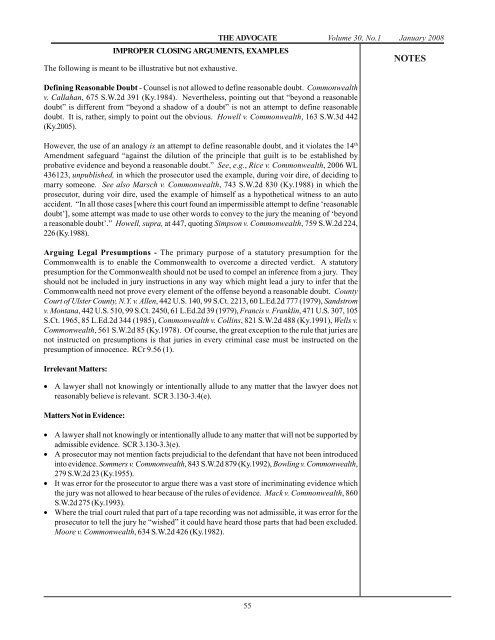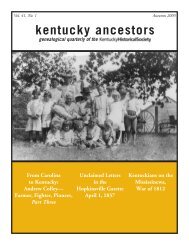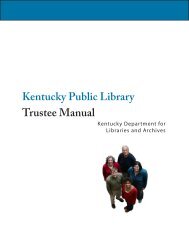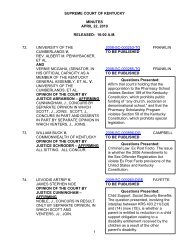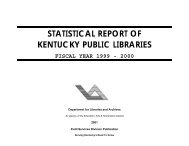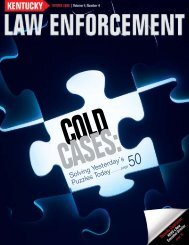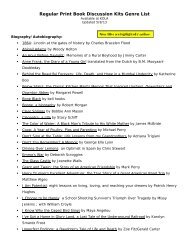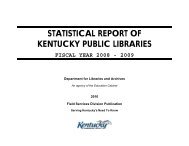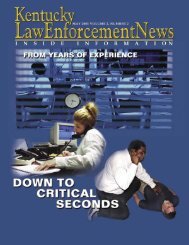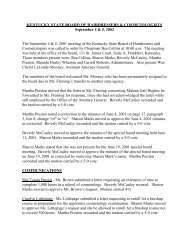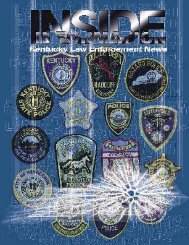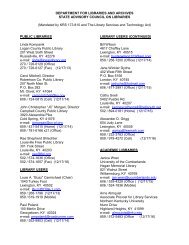Jan08 Advo.pmd - e-archives Home
Jan08 Advo.pmd - e-archives Home
Jan08 Advo.pmd - e-archives Home
You also want an ePaper? Increase the reach of your titles
YUMPU automatically turns print PDFs into web optimized ePapers that Google loves.
IMPROPER CLOSING ARGUMENTS, EXAMPLES<br />
The following is meant to be illustrative but not exhaustive.<br />
THE ADVOCATE Volume 30, No.1 January 2008<br />
Defining Reasonable Doubt - Counsel is not allowed to define reasonable doubt. Commonwealth<br />
v. Callahan, 675 S.W.2d 391 (Ky.1984). Nevertheless, pointing out that “beyond a reasonable<br />
doubt” is different from “beyond a shadow of a doubt” is not an attempt to define reasonable<br />
doubt. It is, rather, simply to point out the obvious. Howell v. Commonwealth, 163 S.W.3d 442<br />
(Ky.2005).<br />
However, the use of an analogy is an attempt to define reasonable doubt, and it violates the 14 th<br />
Amendment safeguard “against the dilution of the principle that guilt is to be established by<br />
probative evidence and beyond a reasonable doubt.” See, e.g., Rice v. Commonwealth, 2006 WL<br />
436123, unpublished, in which the prosecutor used the example, during voir dire, of deciding to<br />
marry someone. See also Marsch v. Commonwealth, 743 S.W.2d 830 (Ky.1988) in which the<br />
prosecutor, during voir dire, used the example of himself as a hypothetical witness to an auto<br />
accident. “In all those cases [where this court found an impermissible attempt to define ‘reasonable<br />
doubt’], some attempt was made to use other words to convey to the jury the meaning of ‘beyond<br />
a reasonable doubt’.” Howell, supra, at 447, quoting Simpson v. Commonwealth, 759 S.W.2d 224,<br />
226 (Ky.1988).<br />
Arguing Legal Presumptions - The primary purpose of a statutory presumption for the<br />
Commonwealth is to enable the Commonwealth to overcome a directed verdict. A statutory<br />
presumption for the Commonwealth should not be used to compel an inference from a jury. They<br />
should not be included in jury instructions in any way which might lead a jury to infer that the<br />
Commonwealth need not prove every element of the offense beyond a reasonable doubt. County<br />
Court of Ulster County, N.Y. v. Allen, 442 U.S. 140, 99 S.Ct. 2213, 60 L.Ed.2d 777 (1979), Sandstrom<br />
v. Montana, 442 U.S. 510, 99 S.Ct. 2450, 61 L.Ed.2d 39 (1979), Francis v. Franklin, 471 U.S. 307, 105<br />
S.Ct. 1965, 85 L.Ed.2d 344 (1985), Commonwealth v. Collins, 821 S.W.2d 488 (Ky.1991), Wells v.<br />
Commonwealth, 561 S.W.2d 85 (Ky.1978). Of course, the great exception to the rule that juries are<br />
not instructed on presumptions is that juries in every criminal case must be instructed on the<br />
presumption of innocence. RCr 9.56 (1).<br />
Irrelevant Matters:<br />
• A lawyer shall not knowingly or intentionally allude to any matter that the lawyer does not<br />
reasonably believe is relevant. SCR 3.130-3.4(e).<br />
Matters Not in Evidence:<br />
• A lawyer shall not knowingly or intentionally allude to any matter that will not be supported by<br />
admissible evidence. SCR 3.130-3.3(e).<br />
• A prosecutor may not mention facts prejudicial to the defendant that have not been introduced<br />
into evidence. Sommers v. Commonwealth, 843 S.W.2d 879 (Ky.1992), Bowling v. Commonwealth,<br />
279 S.W.2d 23 (Ky.1955).<br />
• It was error for the prosecutor to argue there was a vast store of incriminating evidence which<br />
the jury was not allowed to hear because of the rules of evidence. Mack v. Commonwealth, 860<br />
S.W.2d 275 (Ky.1993).<br />
• Where the trial court ruled that part of a tape recording was not admissible, it was error for the<br />
prosecutor to tell the jury he “wished” it could have heard those parts that had been excluded.<br />
Moore v. Commonwealth, 634 S.W.2d 426 (Ky.1982).<br />
55<br />
NOTES


